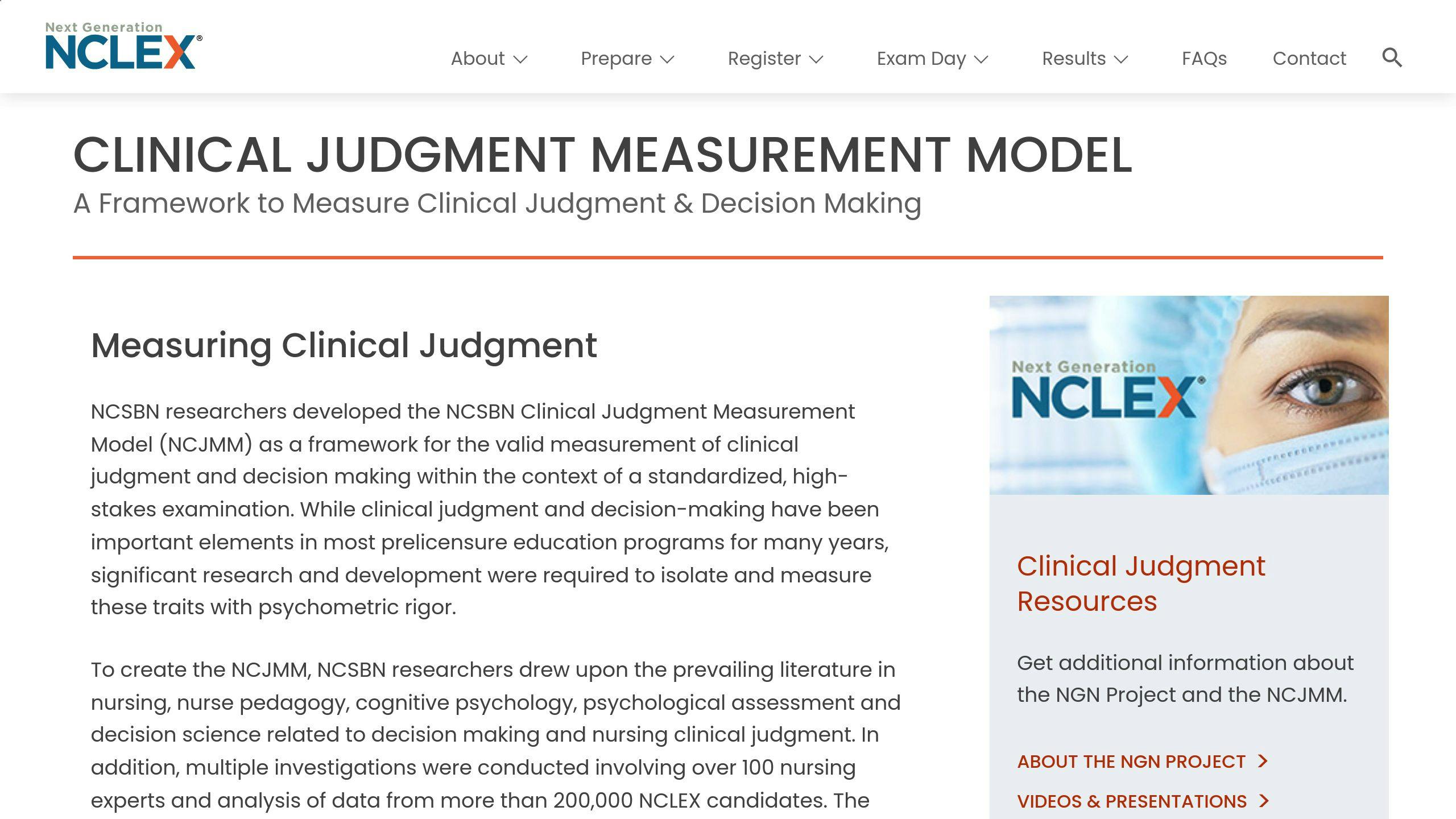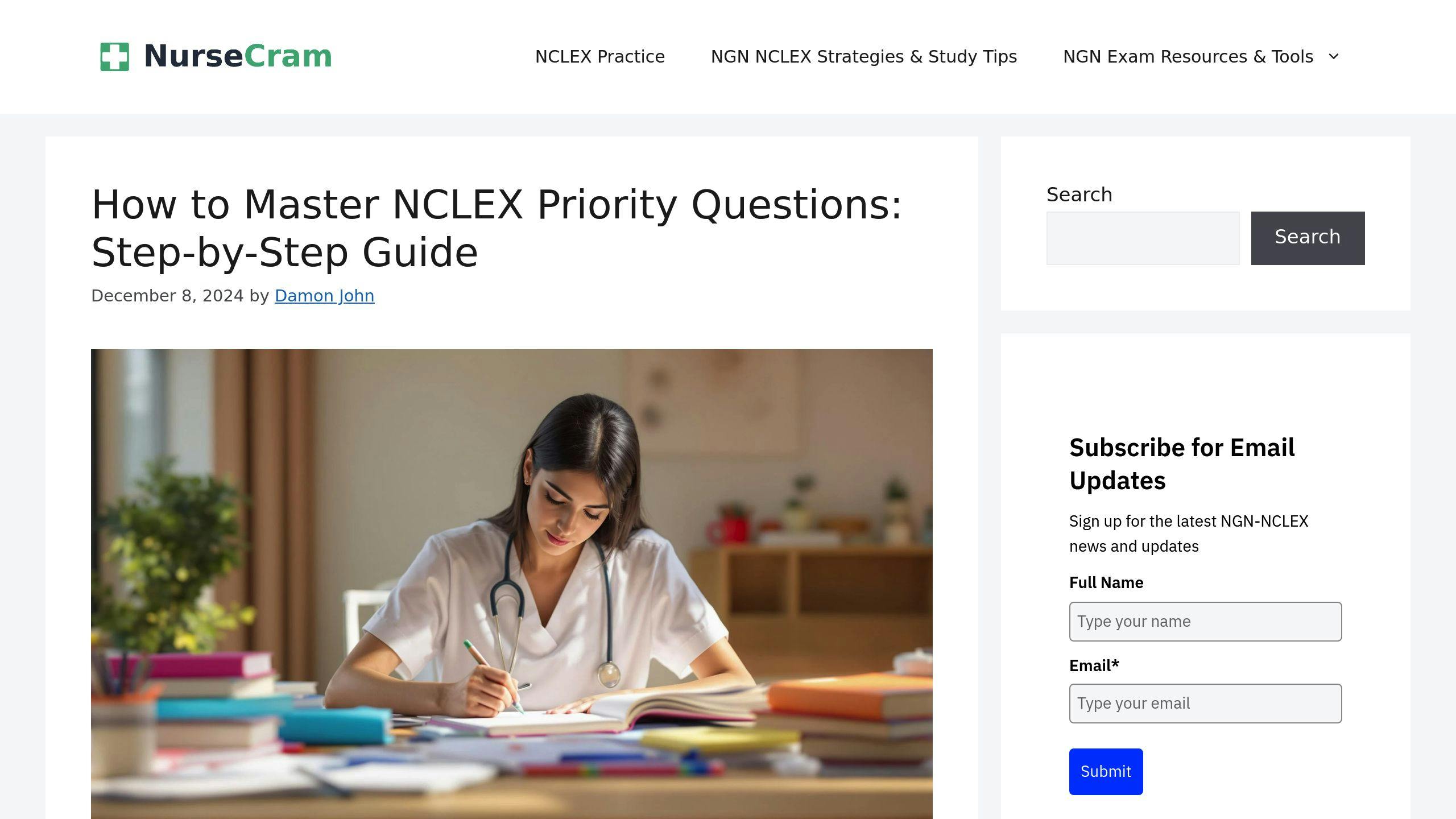Teamwork scenarios on the NGN NCLEX test how well nursing candidates collaborate in real-life healthcare settings. These scenarios focus on clinical judgment and effective teamwork to improve patient safety. Here’s what you need to know:
- Clinical Judgment Model: Guides nurses in recognizing patient changes, prioritizing care, coordinating with teams, and evaluating outcomes.
- Key Skills:
- Clear Communication: Use tools like SBAR for structured, effective messaging.
- Conflict Resolution: Handle disagreements calmly and focus on patient care.
- Team Collaboration: Integrate input from doctors, pharmacists, and others for better care plans.
- Preparation Tips: Practice NGN-style questions that emphasize teamwork, decision-making, and interdisciplinary scenarios.
Mastering these skills ensures nurses are ready to deliver safe, coordinated care in team-based environments.
Nursing Process, Interdisciplinary Team, SBAR Report, Continuity of Care
Key Parts of Teamwork Scenarios
The NGN NCLEX teamwork scenarios emphasize two main aspects: applying clinical judgment and working effectively with an interdisciplinary team. Mastering these areas helps nursing students handle scenarios thoughtfully and efficiently.
Applying the Clinical Judgment Model in Teamwork

The Clinical Judgment Model provides a structured way for nurses to navigate team-based decisions. Here’s how it applies in a collaborative setting:
| Clinical Judgment Step | Team-Based Application |
|---|---|
| Recognizing & Analyzing Cues | Collect and interpret input from team members |
| Prioritizing Hypotheses | Identify key issues through team discussions |
| Generating Solutions | Develop care plans by leveraging team expertise |
| Taking Actions | Coordinate interventions with the healthcare team |
| Evaluating Outcomes | Assess results and gather feedback from team members |
For example, when caring for a patient with both diabetes and heart failure, the nurse must identify critical symptoms, prioritize the most pressing concerns, and work with the healthcare team to implement and evaluate the care plan.
Collaborating with Healthcare Team Members
"The NGN NCLEX emphasizes teamwork, mirroring real-world interdisciplinary collaboration to ensure safe, effective care." [1]
Effective teamwork relies on three core practices:
- Clear Communication and Role Clarity: Use tools like SBAR (Situation, Background, Assessment, Recommendation) while understanding each team member’s role and responsibilities.
- Professional Conflict Resolution: Address disagreements constructively, always focusing on the patient’s well-being.
- Integrated Care Planning: Combine input from all team members to create a well-rounded care strategy.
When working with professionals such as doctors, pharmacists, and social workers, nurses must maintain open communication and respect the unique contributions of each discipline. This collaborative effort ensures patients receive thorough and effective care.
sbb-itb-aa73634
Checklist for Handling Teamwork Scenarios
Recognizing Key Information and Setting Priorities
To prioritize in teamwork situations, start by assessing vital signs, reviewing the patient’s medical history, and gathering input from the team. This helps identify interventions that need immediate attention. Following the Clinical Judgment Model, focus on collecting and analyzing critical patient data to set clear care priorities.
Key steps include:
- Evaluating the patient’s current stability and identifying immediate risks
- Reviewing medical history that could impact care decisions
- Considering observations shared by other healthcare providers
- Pinpointing interventions that need urgent action
Once priorities are in place, the focus shifts to ensuring smooth communication with the team for effective implementation.
Communicating Clearly with the Team
"Clear and concise messaging, active listening, and the use of standardized communication tools like SBAR ensure effective team coordination in high-stakes situations." [1]
Use the SBAR framework to structure communication when sharing important information with team members. This method ensures consistency and clarity, especially in critical situations.
Effective communication not only strengthens teamwork but also helps address conflicts and maintain professional relationships, even in stressful environments.
Managing Conflicts and Team Interactions
Conflict resolution is an essential skill in teamwork scenarios since disagreements can happen even in well-functioning teams. In high-pressure moments, remain calm, focus on patient care, and rely on evidence-based practices to support your viewpoint. Acknowledge different perspectives and work together toward a shared solution. Clarify roles and respect each team member’s expertise to avoid confusion and promote effective collaboration.
Resources to Prepare for Teamwork Scenarios
NurseCram NCLEX Exam Review

NurseCram provides tools specifically aimed at preparing for NGN NCLEX teamwork scenarios. Their platform includes a wide range of interdisciplinary scenarios and interactive NGN-style questions. These questions cover formats like extended multiple choice, cloze-style questions focused on communication protocols, and drag-and-drop exercises. Each scenario is paired with detailed explanations to guide students in improving team collaboration and decision-making. This approach helps build strong clinical judgment skills in team settings.
Alongside these resources, consistent practice with NGN-style questions is key to excelling in teamwork scenarios.
Practice Questions and Scenario Exercises
To prepare effectively for teamwork scenarios, students should regularly work on NGN-style questions that focus on team dynamics, conflict resolution, and delegation. These exercises are designed to:
- Assess team interactions
- Make decisions in interdisciplinary settings
- Review outcomes of team-based actions
Research on team-based learning in accelerated nursing programs found that students who frequently practiced collaborative scenarios showed better clinical judgment skills [2]. These exercises mirror real-world interdisciplinary challenges, helping candidates sharpen the teamwork and communication abilities essential for NGN success.
Final Thoughts on Teamwork Scenarios
To succeed in teamwork scenarios for the NGN NCLEX, it’s important to pull together everything you’ve learned about preparation strategies and available resources. The National League for Nursing highlights the importance of teamwork in nursing practice:
"The Next Generation NCLEX requires higher levels of understanding for new registered nurses to practice safely. Team-based learning offers a rigorous but pragmatic approach to achieve that aim" [2].
Studies show that team-based learning improves outcomes for nursing students [2]. To perform well in these scenarios, focus on strengthening these three areas:
- Clinical Judgment: Learn to identify key details, assess situations, and make decisions effectively within a team.
- Clear Communication: Use tools like SBAR to ensure your messages are structured and easy to understand.
- Conflict Resolution: Approach team challenges calmly and work collaboratively to find solutions.
Related posts
- NGN NCLEX Scenario Exercises: Step-by-Step Practice
- Top 7 Clinical Cues to Watch for in NGN Scenarios
- NGN NCLEX: Prioritization and Delegation Practice Cases
- Top 7 NGN Question Types for Decision-Making

Sophia is the compassionate and knowledgeable face of NurseCram.com. With a passion for helping nursing students excel, she serves as a supportive mentor, providing practical guidance and insights for mastering the NGN NCLEX exams. Her approachable dedication and dedication to education make her the perfect guide for future nurses striving to achieve their dreams. Sophia is here to simplify your learning journey and empower you to succeed!

